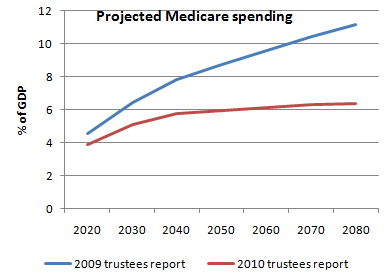General Discussion
Related: Editorials & Other Articles, Issue Forums, Alliance Forums, Region ForumsIf we want to keep Medicare as is we should demand a payroll tax for part B and part D.
The biggest risk to Medicare as we know it is that for doctors and drugs, the premiums only cover 25% and the rest comes from the income tax. As the interest on the national debt grows and grows along with other obligations it will crowd out the capability of the general fund to keep paying the entire obligation to Medicare as Medicare competes with education and housing and food stamps and defense and medicaid and aid to the states and infrastructure and r & d and all the other areas the Federal Government subsidizes.
Having a dedicated fund for Medicare part B and D will keep the programs from being cut. Moreover the tax needs to rise as medical costs rise.
Health costs are only going to grow as a percent of GDP. Without dedicated funding it will only become more of a political football as it competes with every other obligation and promise of the federal government.
Of course we could do something to overhaul the entire health care system which seems preferable to me, but without a huge change in the system itself, it needs a more reliable and dedicated source of funding than income taxes.
oldhippie
(3,249 posts)Ha! There are so many here that will not believe that.
dkf
(37,305 posts)ProSense
(116,464 posts)The government simply needs to negotiate drug prices. What's the point of adding money to pay for an overpriced product?
dkf
(37,305 posts)http://thinkprogress.org/health/2012/12/03/1272461/obamacare-saved-seniors-5-billion/
Imagine the power of negotiating prices.

http://thinkprogress.org/health/2012/11/30/1263231/the-details-of-obamas-entitlement-cuts-in-one-chart/
dkf
(37,305 posts)In fact the fixes for seniors increased the cost to Medicare. You've got this point backwards.
ProSense
(116,464 posts)"In fact the fixes for seniors increased the cost to Medicare. You've got this point backwards."
What absolute nonsense.
Bending The Curve

In other words, the Medicare actuaries believe that the cost-saving provisions in the Obama health reform will make a huge difference to the long-run budget outlook. Yes, it’s just a projection, and debatable like all projections. And it’s still not enough. But anyone who both claims to be worried about the long-run deficit and was opposed to health reform has some explaining to do. All the facts we have suggest that health reform was the biggest move toward fiscal responsibility in a long, long time.
http://krugman.blogs.nytimes.com/2010/08/05/bending-the-curve/
dkf
(37,305 posts)Taking that into account, the CBO’s report estimates that the net cost of closing the donut hole will actually be $51 billion — significantly less than the previous $86 billion estimate.
And I'm talking about your drug negotiation point. They negotiated prices down but increased the govt payment ala the donut hole.
ProSense
(116,464 posts)"Taking that into account, the CBO’s report estimates that the net cost of closing the donut hole will actually be $51 billion — significantly less than the previous $86 billion estimate."
Is $51 billion more than $86 billion?
oldhippie
(3,249 posts)That'll surely work.